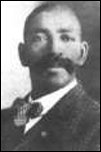Bass Reeves: American Legend

Arkansas-BORN Bass Reeves roamed the American West for more than three decades, chasing murderers, thieves and whiskey smugglers. He usually either brought his outlaw in or left him dead.
Reeves was born in Crawford County, Arkansas, only to be part of a slave family and was one of the first African American to be commissioned a U.S. deputy marshal in the flatlands west of the Mississippi River.
"He walked into the valley of death for 32 years," says Art Burton, whose book Red, Black and Deadly includes a chapter on Reeves. "People wanted this man dead. But he did his job for 32 years. He did an outstanding job and he has to be one of the greatest American folk heroes."
Burton, director of minority affairs at Columbia College of Chicago, also launched a petition that got Reeves into the National Cowboy Hall of Fame in 1992.
Reeves, although born in Arkansas, severed his ties with the state of Texas in the 1850s when an argument over a game of cards with his young master, George Reeves, turned violent. Reeves pummeled George, who went on to become speaker of the Texas House of Representative in 1881 and fled across the border into what was then Indian Territory and now is Oklahoma.
He instantly became a fugitive, passing the next 10 years among the Five Civilized Tribes, his nephew, Paul L. Brady, said in a telephone interview from Atlanta. His time there also came in handy when Reeves began his law enforcement career.
"There was a great deal of distrust of the white man among the Indians," said Brady, 70, who is writing a Reeves biography. "Bass was able to make a lot of friendships out of that. He learned the land and all the potential hideouts."
Reeves left Oklahoma in 1863, after President Abraham Lincoln issued the Emancipation Proclamation, and made his way to Van Buren, Arkansas, where he settled down, married, had children and started a small farm, according to Brady. He also served as a lookout for deputy U.S. marshals working "the dead line" between Arkansas and Indian Territory.
"The Five Civilized Tribes had their own judicial systems, police departments, and two of them had national prisons," Burton said. "But they couldn't try anyone who wasn't a citizen of their nations."
Reeves became a lawman in 1874 when Fort Smith, Arkansas, judge Isaac Parker commissioned about 200 deputy marshals to hunt down fugitives who had escaped into Indian Territory. At the time, deputy marshals were cowboy crusaders, the only lawmen authorized to nab violent fugitives in the Indian Nations.
Among Reeves' most famous exploits was a shoot-out with notorious horse thief and murderer Jim Webb, who had been on the run for two years after killing a black preacher over a minor dispute. The story has Reeves picking off Webb from a quarter mile away.
"A quarter mile is two city blocks," Burton explained. "To call that shot and hit it? If it's true, he was one of the best shots in the West."
And Reeves needed to be a quick shot. Regularly risking his life was part of the job, according to Brady. "The fugitives knew if they were taken in . . . (Judge Isaac Parker) was going to hang them," Brady said. "They'd just as soon have a shoot-out with the deputies."
But Reeves wasn't hasty with his sidearm, Burton said. He always gave the crook a chance to turn himself in. Reeves had killed 14 men by 1907, all of whom had drawn first.
Reeves' devotion to duty was legendary, historians say. He never rejected an assignment and even arrested his own son on a murder warrant. A story in the Muskogee Phoenix newspaper on January 15, 1910, lionized the old marshal and said he "knew no master but duty." "He had such great respect for the law because the law had set him free," said Brady, whose father William Luck traveled with Reeves on several trips into Oklahoma.
In 1907, Oklahoma Territory and Indian Territory were united as the state of Oklahoma, which immediately adopted the Jim Crow laws that made blacks second-class citizens throughout the South. The federal marshals were replaced by state authorities. Reeves joined the Muskogee police force, working a segregated beat in a segregated city.
"Bass Reeves worked to bring about law and order to a terrible area, but when a democratic government was set up, it was worse than before for Bass," Brady said. "What a terrible commentary on progress that is."
Reeves' health failed in January 1910, and he died of Bright's disease in that year. His nephew, born 27 years later, resumed his uncle's legacy. In 1972, Brady became the first African-American appointed a federal administrative law judge.
"This man, his life, illustrates a lesson in a very clear way," Brady said. "Black folks have been serving this country and upholding its laws since the very beginning."
by Dave Michaels
Note: The Three Rivers Museum currently has Bass Reeves tombstone on display. The location of his grave in Muskogee County is unknown.
Visit our Events page for more information about the Bass Reeves Western History Conference held each year in Muskogee.
Reeves was born in Crawford County, Arkansas, only to be part of a slave family and was one of the first African American to be commissioned a U.S. deputy marshal in the flatlands west of the Mississippi River.
"He walked into the valley of death for 32 years," says Art Burton, whose book Red, Black and Deadly includes a chapter on Reeves. "People wanted this man dead. But he did his job for 32 years. He did an outstanding job and he has to be one of the greatest American folk heroes."
Burton, director of minority affairs at Columbia College of Chicago, also launched a petition that got Reeves into the National Cowboy Hall of Fame in 1992.
Reeves, although born in Arkansas, severed his ties with the state of Texas in the 1850s when an argument over a game of cards with his young master, George Reeves, turned violent. Reeves pummeled George, who went on to become speaker of the Texas House of Representative in 1881 and fled across the border into what was then Indian Territory and now is Oklahoma.
He instantly became a fugitive, passing the next 10 years among the Five Civilized Tribes, his nephew, Paul L. Brady, said in a telephone interview from Atlanta. His time there also came in handy when Reeves began his law enforcement career.
"There was a great deal of distrust of the white man among the Indians," said Brady, 70, who is writing a Reeves biography. "Bass was able to make a lot of friendships out of that. He learned the land and all the potential hideouts."
Reeves left Oklahoma in 1863, after President Abraham Lincoln issued the Emancipation Proclamation, and made his way to Van Buren, Arkansas, where he settled down, married, had children and started a small farm, according to Brady. He also served as a lookout for deputy U.S. marshals working "the dead line" between Arkansas and Indian Territory.
"The Five Civilized Tribes had their own judicial systems, police departments, and two of them had national prisons," Burton said. "But they couldn't try anyone who wasn't a citizen of their nations."
Reeves became a lawman in 1874 when Fort Smith, Arkansas, judge Isaac Parker commissioned about 200 deputy marshals to hunt down fugitives who had escaped into Indian Territory. At the time, deputy marshals were cowboy crusaders, the only lawmen authorized to nab violent fugitives in the Indian Nations.
Among Reeves' most famous exploits was a shoot-out with notorious horse thief and murderer Jim Webb, who had been on the run for two years after killing a black preacher over a minor dispute. The story has Reeves picking off Webb from a quarter mile away.
"A quarter mile is two city blocks," Burton explained. "To call that shot and hit it? If it's true, he was one of the best shots in the West."
And Reeves needed to be a quick shot. Regularly risking his life was part of the job, according to Brady. "The fugitives knew if they were taken in . . . (Judge Isaac Parker) was going to hang them," Brady said. "They'd just as soon have a shoot-out with the deputies."
But Reeves wasn't hasty with his sidearm, Burton said. He always gave the crook a chance to turn himself in. Reeves had killed 14 men by 1907, all of whom had drawn first.
Reeves' devotion to duty was legendary, historians say. He never rejected an assignment and even arrested his own son on a murder warrant. A story in the Muskogee Phoenix newspaper on January 15, 1910, lionized the old marshal and said he "knew no master but duty." "He had such great respect for the law because the law had set him free," said Brady, whose father William Luck traveled with Reeves on several trips into Oklahoma.
In 1907, Oklahoma Territory and Indian Territory were united as the state of Oklahoma, which immediately adopted the Jim Crow laws that made blacks second-class citizens throughout the South. The federal marshals were replaced by state authorities. Reeves joined the Muskogee police force, working a segregated beat in a segregated city.
"Bass Reeves worked to bring about law and order to a terrible area, but when a democratic government was set up, it was worse than before for Bass," Brady said. "What a terrible commentary on progress that is."
Reeves' health failed in January 1910, and he died of Bright's disease in that year. His nephew, born 27 years later, resumed his uncle's legacy. In 1972, Brady became the first African-American appointed a federal administrative law judge.
"This man, his life, illustrates a lesson in a very clear way," Brady said. "Black folks have been serving this country and upholding its laws since the very beginning."
by Dave Michaels
Note: The Three Rivers Museum currently has Bass Reeves tombstone on display. The location of his grave in Muskogee County is unknown.
Visit our Events page for more information about the Bass Reeves Western History Conference held each year in Muskogee.
Muskogee's Regional Heritage CenterWith Assistance from the City of Muskogee
(c) 2024 Three Rivers Museum
|
FInd-Contact-connectMuseum Hours Facebook
Wednesday-Saturday 10 a.m.-5 p.m. Newsletter/Mailing List Contact Info 220 Elgin Muskogee, OK 74401 918-686-6624 [email protected] |
